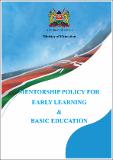Mentorship Policy for Early Learning and Basic Education 2019
View/
Publication Date
2019Author
Type
Policy Paperviews
downloads
Metadata
Show full item recordBy
Ministry of Education
Abstract/
The Mentorship Policy is anchored on Article 10 of the Constitution of Kenya 2010 which prescribes the national values and principles that need to be inculcated into all Kenyans. The Kenya Vision 2030, which is Kenya’s blueprint for social, economic and political development, aims at making Kenya “a newly industrializing, middle income country providing high quality life for all its citizens by the year 2030”. The education system should therefore endeavor to develop youths who are properly mentored in order to achieve this vision. The national goals of education 3 and 4 stipulate that education should promote individual development, self-fulfillment and sound moral and religious values respectively. Learners should be accorded opportunities to develop their full potential while enhancing the acquisition of sound moral values that help them to grow into self-disciplined, self-reliant and integrated citizens. The Early Learning and Basic Education Act 2013 provides that a parent/guardian shall have the right to participate in the character development of his/her child. Parents and guardians should therefore be the first mentors of the child. The National Education Sector Plan (2013- 2018) provides for molding, mentoring and nurturing of national values. It further champions a value based education system and the need to transmit life skills, principles and values for personal, social and economic development.
Subject/
Education Sector; Mentorship Programmes; Early Childhood Education; Basic Education
Publisher
Ministry of EducationSeries
Policy Paper of 2019;Collections
- Policy Papers [117]

